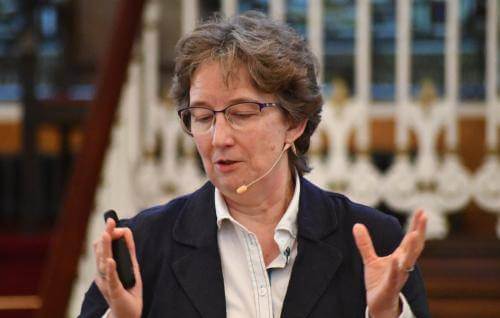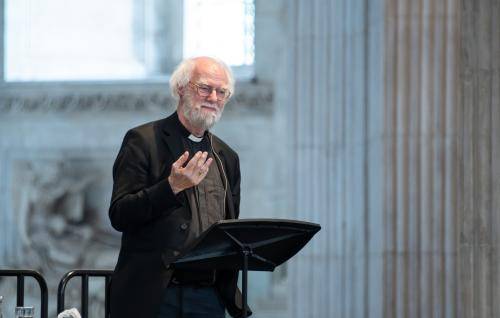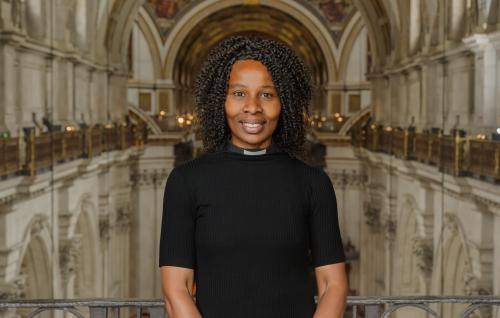Faith and Politics
Faith and Politics
Graeme Smith reflects on Christians' involvement in politics.
1. Guiding Principles
It is reported that when news spread that the well-loved Archbishop, William Temple, had died prematurely in 1944, people on trams had tears in their eyes.
Temple’s most famous book is Christianity and Social Order, in which he discussed why, and how, Christians should be involved in politics. The question of involvement was a relatively new one, in part provoked by the emerging phenomenon of secularism which Temple had learnt about at the Jerusalem 1928 International Missionary Conference. What has endured from Temple’s book is not so much his rationale for engagement, that argument is largely over, but the more vexed question of how should Christians be involved.
Temple argued Christians who are well-versed in theology are not thereby equipped to comment on what might be appropriate housing policy or education reform. That should be left to the non-theological domain of detailed political policy, which is the preserve of party politicians.
What Christians can do is offer guiding principles or values which should be taken into account by politicians when they are deciding on policies. Temple called these ‘middle axioms’ and he listed relevant ones in an appendix.
Versions of Temple’s middle axioms approach have informed much Church of England political theology ever since, a prime example being the controversial Faith in the City report in 1985. They also inform the appeal of single issue campaign groups, over political parties, for most socially and politically concerned Christians. There are however two problems with the approach. First there is no good reason why politicians should listen to theologians, and so usually they don’t. Second it adopts the Modernist assumption that there is a Christian theological world and a separate secular political world. As we go on to see this assumption is increasingly in doubt as what we thought we knew about secularism is called into question.
2. Personal Values
The UK religious landscape is not as straightforwardly secular as we once thought.
There is no doubt that the institutional Christian churches are in trouble. The numbers of those attending have been declining significantly. Fewer people get married, have their children baptised or have funerals in church. Christian festivals are treated as secular holidays and the numbers offering for ministry are declining. There are always pockets which buck the trend but the overall picture is bleak and it is no surprise that the Church of England is focusing its resources on increasing membership.
To say that secularism is not as straightforwardly ascendant as was once thought is not to say this picture is inaccurate. However it is not the whole picture. Grace Davie has captured the ambiguity with her idea ‘believing without belonging’.
We live in an increasingly fragmented society in which people do not belong to clubs and societies in the ways they once did. Political parties suffer poor attendance at meetings. But this does not mean that people no longer subscribe to the beliefs of an organisation.
People may not go to church, but they do still believe in God. When Tony Blair stated that he believed in God it chimed with 80% of his constituency, according to the 2001 Census. These numbers have declined since then, it seems not belonging has consequences for believing, but Christianity is still influential in UK politics.
The question is how? Blair’s answer was through personal values, an answer remarkably similar to William Temple’s ‘middle axioms’ which we explored previously. Blair’s values came from his faith, and these values shaped and informed the policy decisions he made. It is a Modernist answer in that it assumes belief is a private matter which forms the attitudes and behaviour of the individual. Beliefs act as motivation for political choices. It is close to the idea of ‘the end justifying the means’.
The challenge of a re-thought secularism is that this division is not as clear cut as Blair might think. We’ll think further about this next time.
3. Ethical Codes
Margaret Thatcher saw her Christianity and her politics as two sides of the same coin.
Famously she was raised a Methodist, the daughter of a shopkeeper, alderman and lay preacher. She was formed by an identity which believed faithful Christian discipleship consisted of hard work, thrift, personal responsibility (especially saving for a rainy day), family care and charity.
We can call this a Protestant Non-Conformity and it shapes her religious, political and personal identity. This identity shaped her hatred of the Soviet Union and her dislike of the European Union. The latter was fine when it provided opportunities for entrepreneurs through the single market, but morally dangerous when it removed from people the requirement to be responsible, delegating that to the State. It might be thought that these notions of thrift, personal responsibility and charity were her values in much the same way as Tony Blair. However this is to miss the depth with which they shaped all aspects of her life, personal and political. They formed the ethical code by which she lived, and judged others. To extend the power of the State, in ways the Faith in the City report proposed, was not just bad politics, it was morally wrong.
Thatcher was, in her own words, engaged in a spiritual revolution which would bring back pride and prosperity. And it was a message which chimed with a majority of people in the UK.
It has produced a political ethos which remains dominant in our political culture. Politicians on the Left, as well as the Right, talk about the need to help ‘hard-working families’. Public finances cannot support a welfare State or educational provision that ‘we cannot afford’. The question is, if this political culture is so dominant, how are there people on the Left who argue the State should do more?
4. Common Good
If Protestant Non-Conformity is the dominant identity in UK politics then why are there so many on the Left who oppose it, including many clergy?
The answer is straightforward. It is dominant but it is not exclusive. There is at least one other identity, something that can be called a Catholic Common Good identity.
The ideas that underpin this identity are determinist, people who are poor or oppressed are so usually because of circumstances well beyond their control. Poor people have fewer opportunities to succeed because of the impact of their poverty on their education and health. Poverty is a generational vicious circle. So, to bring about change, to achieve justice, the State must intervene. State intervention is not a moral evil but the only way to achieve moral good.
In this way of thinking, Protestant Non-Conformity is regarded as at best ignorant and at worst deliberately ethically cruel. As far as Catholic Common Good advocates are concerned, Protestant Non-Conformists are privileged, selfish and exploitative.
All of which means we have two competing ethical codes both grounded in our Christian heritage. For one to regard the other as immoral is to fail to understand its Christian heritage and ethical identity. But what is to be done if these two sides are not merely to shout at each other?
My view is that Protestant Non-Conformity is dominant in the UK and any politics of the Left - of Catholic Common Good - needs to accommodate with the responsible individualism it advocates. This means finding ways to combine the rhetoric of hard work, thrift, charity and personal responsibility with the rhetoric of State intervention. This will look like a type of social or radical individualism. It is what New Labour looked for, as does Starmer. It will earn him the critique of the Left. However it is the most radical option open to him, given our dominant Christian ethical culture.








